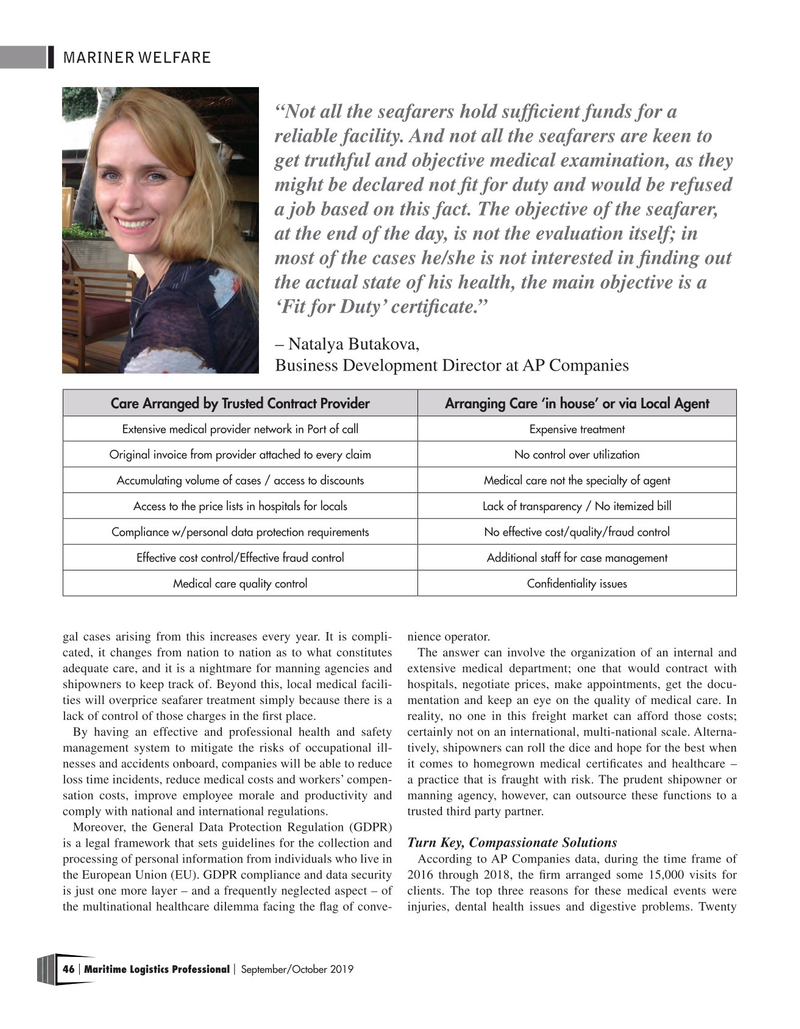
Page 46: of Maritime Logistics Professional Magazine (Sep/Oct 2019)
Energy Ports Oil-Gas-LNG
Read this page in Pdf, Flash or Html5 edition of Sep/Oct 2019 Maritime Logistics Professional Magazine
MARINER WELFARE “Not all the seafarers hold suffcient funds for a reliable facility. And not all the seafarers are keen to get truthful and objective medical examination, as they might be declared not ft for duty and would be refused a job based on this fact. The objective of the seafarer, at the end of the day, is not the evaluation itself; in most of the cases he/she is not interested in fnding out the actual state of his health, the main objective is a ‘Fit for Duty’ certifcate.” – Natalya Butakova,
Business Development Director at AP Companies
Care Arranged by Trusted Contract Provider Arranging Care ‘in house’ or via Local Agent
Extensive medical provider network in Port of call Expensive treatment
Original invoice from provider attached to every claim No control over utilization
Accumulating volume of cases / access to discounts Medical care not the specialty of agent
Access to the price lists in hospitals for locals Lack of transparency / No itemized bill
Compliance w/personal data protection requirements No effective cost/quality/fraud control
Effective cost control/Effective fraud control Additional staff for case management
Medical care quality control Confdentiality issues gal cases arising from this increases every year. It is compli- nience operator.
cated, it changes from nation to nation as to what constitutes The answer can involve the organization of an internal and adequate care, and it is a nightmare for manning agencies and extensive medical department; one that would contract with shipowners to keep track of. Beyond this, local medical facili- hospitals, negotiate prices, make appointments, get the docu- ties will overprice seafarer treatment simply because there is a mentation and keep an eye on the quality of medical care. In lack of control of those charges in the frst place. reality, no one in this freight market can afford those costs;
By having an effective and professional health and safety certainly not on an international, multi-national scale. Alterna- management system to mitigate the risks of occupational ill- tively, shipowners can roll the dice and hope for the best when nesses and accidents onboard, companies will be able to reduce it comes to homegrown medical certifcates and healthcare – loss time incidents, reduce medical costs and workers’ compen- a practice that is fraught with risk. The prudent shipowner or sation costs, improve employee morale and productivity and manning agency, however, can outsource these functions to a comply with national and international regulations. trusted third party partner.
Moreover, the General Data Protection Regulation (GDPR) is a legal framework that sets guidelines for the collection and
Turn Key, Compassionate Solutions processing of personal information from individuals who live in According to AP Companies data, during the time frame of the European Union (EU). GDPR compliance and data security 2016 through 2018, the frm arranged some 15,000 visits for is just one more layer – and a frequently neglected aspect – of clients. The top three reasons for these medical events were the multinational healthcare dilemma facing the fag of conve- injuries, dental health issues and digestive problems. Twenty 46 Maritime Logistics Professional September/October 2019 | |

 45
45

 47
47
